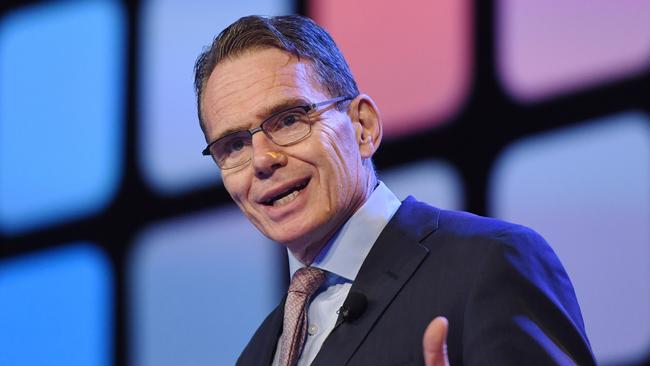Rio sticks with Minerals Council of Australia despite green activists
Rio Tinto has committed to remain in the Minerals Council of Australia despite an activist shareholder push.

Rio Tinto has committed to remain in the Minerals Council of Australia despite an activist shareholder push that last year led BHP to threaten to leave the lobby group if did not tone down its lobbying for clean coal and Australian energy policy that prioritised cost and reliability.
The commitment was made yesterday as the MCA released a new climate policy that has dropped any reference to cleaner coal-fired power and appears to have soothed tensions on climate policy among its three big members, Rio, BHP and Glencore.
The new policy, and recent MCA statements, look to have secured BHP’s membership.
Rio yesterday advised shareholders to vote against two special resolutions put forward by the non-profit Australasian Centre for Corporate Responsibility.
One of the resolutions, to be put to the company’s Melbourne AGM on May 2, called for a review of MCA membership, and that of other global member groups, because of their climate change lobbying.
The other resolution was procedural and needs to pass to allow the MCA resolution.
In its response to the resolutions, Rio said industry member groups such as the MCA provided the chance to understand diverse views and share best practice, perspectives and experiences.
“The positions that industry associations take need to consider a range of members’ views, and the nuance and emphasis of positions may differ from that of Rio Tinto,” Rio said.
“Diverse and differing views should always be heard and are an important step in finding compromise that allows progress.”
Rio, which no longer mines thermal coal, said it would not follow BHP in reviewing lobby group membership but would identify where its climate policy position differed from industry groups.
The ACCR, which is representing 0.24 per cent of shareholders in Rio’s Australian-listed shares, said Rio’s response was disappointing.
“The board’s position will reinforce shareholder concerns that Rio is flat-footed in their response to the damaging activities of coal lobbyists, especially when compared with their major competitor, BHP,” ACCR executive director Brynn O’Brien said.
“The resolution simply aims to put in place a transparent governance framework, to give investors some comfort that these relationships are subject to appropriate oversight.”
In response to a similar resolution last year, BHP under chief executive Andrew Mackenzie conducted a review that put the MCA on notice about its coal lobbying.
The MCA’s new energy and climate change policy was posted to the group’s website yesterday.
The main difference to its old policy statement, formed in 2012 but still displayed earlier this month, is that references to so-called high-efficiency, low-emissions coal-fired generators and carbon capture and storage projects have been removed.
“The MCA believes a technology-neutral approach should be adopted for all low-emissions energy sources where no one technology is favoured to the exclusion of others,” the policy says.
The MCA has added emissions reduction to what it previously called a “national priority” of energy affordability and reliability.
“Reliable and affordable energy is central to our economy,” the new policy says.
“Policy measures must deliver reliable energy at least cost while putting Australia on a pathway to meeting its emissions reduction targets.”
In its resolution response, Rio said the MCA statement affirmed positions on key aspects of energy and climate change policy that the miner considered important.
Both BHP and Glencore, whose coal chief Peter Freyberg last year said heavy industry should be ringfenced from climate policy moves and the nation should consider delaying emissions reductions commitments, backed the MCA statement.
“BHP notes the publication of the MCA’s energy and climate change policy position, which incorporates a technology-neutral approach as well as acknowledging the need to achieve affordable and reliable energy while ensuring that Australia is able to meet its emission reduction commitments,” a BHP spokesman said.
Last month, BHP’s Mr Mackenzie told ABC Radio that BHP was “pretty close” to alignment with the MCA and wanted to remain a member.
A Glencore spokesman said the miner “is supportive of the MCA’s policy position on energy and climate change”.

To join the conversation, please log in. Don't have an account? Register
Join the conversation, you are commenting as Logout